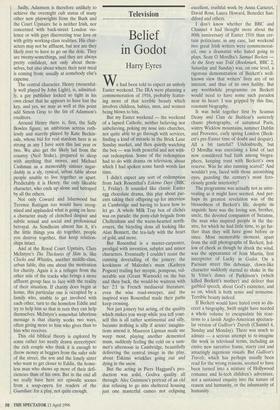Television
Belief in Godot
Harry Eyres
We had been told to expect an unholy Easter weekend. The IRA were planning a commemoration of 1916, probably featur- ing more of that terrible beauty which involves children, babies, men, and women being blown to bits.
But my Easter weekend — the weekend of a lapsed Catholic, neither believing nor unbelieving, poking my nose into churches, not quite able to go through with services, finding a kind of miracle in the Brick Lane Sunday market, and then quietly watching the box — was both peaceful and not with- out redemption. Some of the redemption had to do with drama on television, about which I had spoken some harsh words last time.
I didn't expect any sort of redemption from Jack Rosenthal's Eskimo Days (BBC 1, Friday). It sounded like classic Easter egg chocolate drama, this play about par- ents taking their offspring up for interview at Cambridge and having to learn how to let go. A whole Milk Tray box of clichés was on parade: the pony-club brigade from Cheltenham and the warm-hearted north- erners, the bicycling dons all looking like Alan Bennett, the tea-lady with the heart of gold, and more.
But Rosenthal is a master-carpenter, prodigal with invention, subplot and minor characters. Eventually I couldn't resist the cunning dovetailing of the joinery: the kookiness of Malcolm's mum (Kathryn Pogson) trailing her myopic, pompous, vul- nerable son (Grant Warnock) on the bus and then back, the would-be waitress with her 2:1 in French mediaeval literature, even the wise road-sweeper, and the inspired ways Rosenthal made their paths keep crossing.
Not just joinery but acting, of the quality which makes you weep while you tell your- self this is all rather sentimental and silly, because nothing is silly if actors' imagina- tions amend it. Maureen Lipman made me weep most, playing another demented mum, suddenly feeling the cold on a sum- mer's afternoon in Cambridge, beautifully delivering the central image in the play, about Eskimo wrinklies going out and dying in the snow.
But the acting in Piers Haggard's pro- duction was solid, Godiva quality all through: Alec Guinness's portrait of an old don refusing to go into sheltered housing just one masterful cameo not eclipsing excellent, truthful work by Anna Carteret, David Ross, Laura Howard, Benedict San- diford and others.
I don't know whether the BBC and Channel 4 had thought more about the 80th anniversary of Easter 1916 than cer- tain politicians: in any case, last weekend two great Irish writers were commemorat- ed, one a dramatist who hated going to plays. Sean 0 Mordha's Samuel Beckett As the Story was Told (Bookmark, BBC 2, Saturday and Sunday) was, on one level, a rigorous demonstration of Beckett's well- known view that writers' lives are of no interest, and thus of its own futility. But any worthwhile programme on Beckett would need to have some such paradox near its heart: I was gripped by this fine, resonant biography.
It was held together first by Seamus Deasy and Cian de Buitlear's austerely chaste photography, of autumnal Paris, wintry Wicklow mountains, summer Dublin and Provence, early spring London (Beck- ett's pre-Easter time of doubt and despair). All a bit tasteful? Undoubtedly, but 0 Mordha was exercising a kind of tact now considered bad faith among biogra- phers, keeping trust with Beckett's own reserve. Was he also running scared? And wouldn't you, faced with those astonishing eyes, guarding the century's most fero- ciously gentle interiority?
The programme was actually not as unre- vealing as it might have seemed. And per- haps its greatest revelation was of the blessedness of Beckett's life, despite its anguish: here was the loving son, brother, uncle, the devoted companion of Suzanne, the man who inspired people in the the- atre, for which he had little time, to go fur- ther than they will have gone before or since. Most memorable moment, apart from the still photographs of Beckett, hol- low of cheek as though he drank the wind, was the appearance of Jean Martin, first interpreter of Lucky in Godot. On a Parisian street this debonair, clown-like character suddenly started to shake in the St Vitus's dance of Parkinson's (which killed Beckett's mother) and deliver that garbled speech, about God's existence, and so on, which is both sense and nonsense. Terrible beauty indeed.
If Beckett would have hated even so dis- creet a biography, Swift might have needed a whole volume to encapsulate his reac- tions to a lavish Anglo-American spectacu- lar version of Gulliver's Travels (Channel 4, Sunday and Monday). There was much to admire — a serious attempt to re-imagine the work in televisual terms, including an entire new narrative frame, starry cast and amazingly ingenious visuals. But Gulliver's Travels, which has perhaps usually been read for the wrong reasons, seemed to have been turned into a mixture of Hollywood romance and hi-tech children's adventure, not a sustained enquiry into the nature of reason and humanity, or the inhumanity of humanity.


































































 Previous page
Previous page